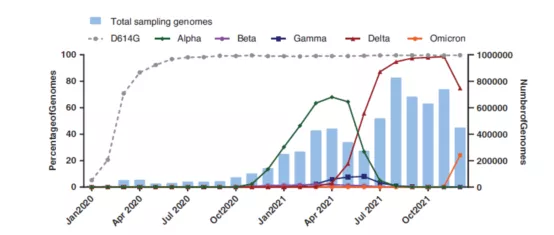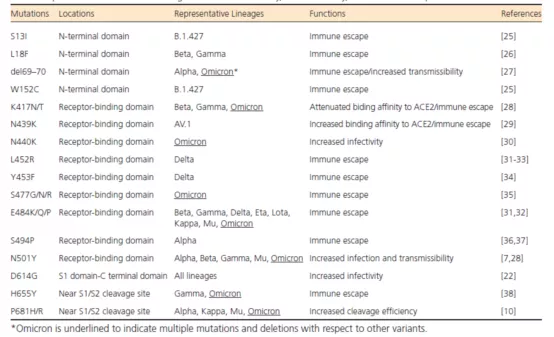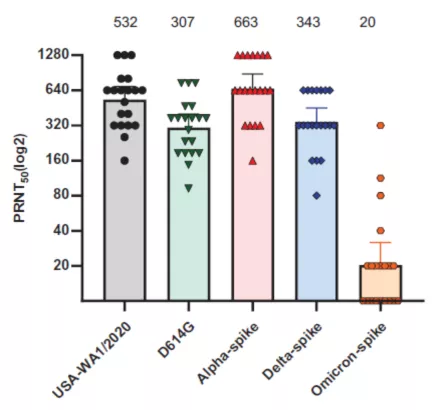New Coronavirus (COVID-1) Variants and Vaccination
- Why Lecanemab’s Adoption Faces an Uphill Battle in US?
- Yogurt and High LDL Cholesterol: Can You Still Enjoy It?
- WHO Releases Global Influenza Vaccine Market Study in 2024
- HIV Infections Linked to Unlicensed Spa’s Vampire Facial Treatments
- A Single US$2.15-Million Injection to Block 90% of Cancer Cell Formation
- WIV: Prevention of New Disease X and Investigation of the Origin of COVID-19
New Coronavirus (COVID-1) Variants and Vaccination
- Red Yeast Rice Scare Grips Japan: Over 114 Hospitalized and 5 Deaths
- Long COVID Brain Fog: Blood-Brain Barrier Damage and Persistent Inflammation
- FDA has mandated a top-level black box warning for all marketed CAR-T therapies
- Can people with high blood pressure eat peanuts?
- What is the difference between dopamine and dobutamine?
- How long can the patient live after heart stent surgery?
New Coronavirus (COVID-1) Variants and Vaccination.
Since it was first reported in late 2019, the novel coronavirus (COVID-19) caused by infection with the novel coronavirus SARS-CoV-2 has caused a global pandemic.
As of January 5, 2022, there have been nearly 300 million infected cases worldwide, and more than 540 people have died from this virulent infectious disease.
The economic loss caused by the global pandemic of the COVID-19 pneumonia epidemic has exceeded 10 trillion US dollars.
Over the past 2 years (2020 and 2021), the continuous evolution of the SARS-CoV-2 virus in the human host has resulted in the emergence of various virus variants with a high degree of transmissibility, disease severity and immune evasion. abilities vary.
While Covid-19 vaccines are being developed and used for immunization at an unprecedented rate, the emergence of SARS-CoV-2 virus variants poses an ongoing threat to the efficacy of these approved vaccines.
On February 8, 2022, researchers from University of Texas Medical Branch published online the review paper “SARS-CoV-2 Variants and Vaccination” .
This review provides an overview of key SARS-CoV-2 virus variants and their spike protein mutations, and their significance in viral replication, spread, and immune evasion.
Since the SARS-CoV-2 virus was first reported in late 2019, the virus has continued to evolve and lead to the emergence of various variants. Among these SARS-CoV-2 strains, some variants have competitive advantages over others during virus evolution.
The D614G variant is the first SARS-CoV-2 virus spike protein variant to appear, which can increase the replication capacity of the virus in the upper digestive tract of the human body; after the appearance of this variant, it quickly replaced almost all pre-June 2020. SARS-CoV-2 virus strain.
Subsequently, the alpha variant (B.1.1.7 variant) emerged in the UK and quickly spread to other parts of the world.
In October 2020, the delta variant (B.1.617.2 variant) appeared in India and spread rapidly and replaced the global alpha variant. The Omicron variant, which was first discovered in South Africa in November 2021, has spread explosively in many countries around the world.
It spreads much faster than the delta strain and can escape the neutralizing antibodies induced by various monoclonal antibodies and vaccines.
The United States even reported more than 1 million cases of Omicron variant infection in a single day (Figure 1).

Figure 1 The mutation frequency of different variant strains in the SARS-CoV-2 virus genome sequence over time
The spike protein is a major determinant of the infectivity and transmissibility of the SARS-CoV-2 virus.
The D614G substitution is the first dominant mutation in the spike protein, which can significantly improve the infectivity and transmissibility of the virus variant.
The N501Y mutation in the receptor binding domain of the spike protein is the most important amino acid substitution of the α variant, which greatly improves the affinity with the human ACE2 receptor, resulting in rapid infection of the upper gastrointestinal tract and high viral transmission.
The delta variant has the spike protein P681R mutation, which can improve the virus’s ability to replicate and infect.
The Omicron variant contains more than 30 spike protein mutations, some of which can be found in α, β, γ, delta and other variants, while K417N, E484K, N501Y and other mutations can improve virus infectivity, transmission and immune evasion ability.

Table 1 Important mutations that increase the infectivity, transmissibility and immune evasion of SARS-CoV-2 virus
Several Covid-19 vaccines have been approved to build a herd immunity barrier around the world.
The BNT162b2 mRNA vaccine is one of the most widely used COVID-19 vaccines, widely used in North America and Europe.
Given the frequent mutations of the SARS-CoV-2 virus spike protein, some emerging variants are less susceptible to neutralization by antibodies produced after vaccination or natural infection.
The neutralization titer of the chimeric spike protein variant SARS-CoV-2 virus on human serum is usually measured to evaluate the immunization effect of the vaccine.
The α variant has higher virus infectivity and transmissibility, but the neutralizing antibody titer induced by the alpha variant is similar to that of the wild strain; the neutralizing antibody titer induced by D614G and representative delta variants is slightly lower than that of the wild strain (figure 2).
Unfortunately, two doses of BNT162b2 mRNA vaccination were not sufficient to induce strong neutralization of anti-Cron mutant antibodies, and the titers of neutralizing antibodies against KR mutant were significantly lower in the infected and vaccinated populations However, the BNT162b2 mRNA vaccine booster (the third dose) can induce strong neutralizing antibodies against the Omicron variant.

Figure 2 Serum neutralizing antibody titers of different SARS-CoV-2 virus variants
To date, neutralizing antibody levels induced by the third dose of BNT162b2 mRNA vaccine remained high 4 months after vaccination, but the persistence of neutralizing antibodies 4 months after the third dose remains to be further investigated. Based on previous research results, a two-pronged strategy is recommended: on the one hand, the currently approved safe and effective vaccine booster should be used; mRNA vaccine technology provides the possibility for rapid improvement of the spike protein sequence.
Real-world vaccine efficacy data and laboratory studies are urgently needed to guide the implementation of this two-pronged immunization strategy.
In the two years since the global pandemic of the COVID-19 pneumonia epidemic, a variety of SARS-CoV-2 variants have been emerging, and the currently popular Omicron may not be the last variant.
While these variants evade the immune protection of vaccination and/or natural infection, there is evidence that vaccination minimizes the proportion of severe cases and significantly reduces hospital admissions and mortality.
Herd immunity, booster shots, wearing masks, and social distancing are the most effective strategies to finally end the COVID-19 pandemic.
Reference:
https://www.scienceopen.com/hosted-document?doi=10.15212/ZOONOSES-2022-0001
New Coronavirus (COVID-1) Variants and Vaccination
(source:internet, reference only)
Disclaimer of medicaltrend.org
Important Note: The information provided is for informational purposes only and should not be considered as medical advice.



